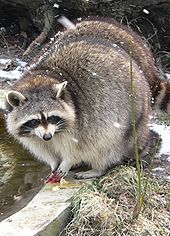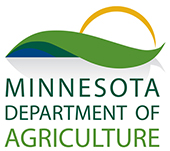Raccoon Removal MN
Most people think of the raccoon as being a sweet and cuddly creature but as you are about to discover, many raccoon facts say otherwise. Even though they may seem harmless, raccoons can become a huge nuisance very quickly. Yes, raccoons are cute and they are furry but this wild animal is known for causing a variety of problems.
Raccoons are commonly referred to as the “masked bandit” for good reason. One of the interesting raccoon facts is that this animal can get into just about ANYTHING! Literally, they can open doors, pull out drawers, open fish traps, you name it. Because of their nimble little hands, sheer determination, and natural curiosity when it comes to food, raccoons are notorious for making a mess as they search for something to eat.
Did you know that the raccoon is also regarded to be one of the most intelligent animals of the world? Studies have revealed that they have the tendency to remember tasks which they are made to perform even after a gap of three years.
 Their long delicate fingers easily open clam shells, trash cans and doors.They are true omnivores and are opportunistic in their diet. They will eat fruit, insects, berries, nuts, eggs, small rodents, grapes, corn, crabs, crayfish and anything edible you may have left in the backyard. It was once thought that raccoons washed their food. They do not. Raccoons have a highly sensitive sense of touch which water helps to enhance. Even when water is unavailable, raccoons will use the same motions while they manipulate their food or objects they are interested in. This tactile experience gives the raccoon a better sense of what it will be eating. It is as if they “see” with their hands.
Their long delicate fingers easily open clam shells, trash cans and doors.They are true omnivores and are opportunistic in their diet. They will eat fruit, insects, berries, nuts, eggs, small rodents, grapes, corn, crabs, crayfish and anything edible you may have left in the backyard. It was once thought that raccoons washed their food. They do not. Raccoons have a highly sensitive sense of touch which water helps to enhance. Even when water is unavailable, raccoons will use the same motions while they manipulate their food or objects they are interested in. This tactile experience gives the raccoon a better sense of what it will be eating. It is as if they “see” with their hands.
Raccoon kits (usually 3 – 6 of them) are born 2 months after mating. They are weaned by 8 weeks, and soon after will go on foraging trips with their mother. She will teach them how to climb, swim and find food. This is the only time you will typically see groups of raccoons together. Be cautious about approaching them. Females will be extremely aggressive and ferocious if they feel their young are threatened. Many raccoon kits will “winter over” with their mothers and not leave until spring.
Raccoons do not hibernate, but they will feed heavily in the fall, storing extra fat so they can stay in their burrows through the worst parts of winter. Raccoons are generally nocturnal. If you find a raccoon wandering about or stumbling during the day, especially in populated areas, do not go near it. Raccoons are carriers of rabies and distemper and can transfer these diseases to humans. Do not “dispose” of the raccoon either. It is best to call a Wildlife Rehabilitation Center and let them take care of the animal.
Raccoon Facts
- Raccoons are nocturnal animals that love to live near a good source of food.
- Raccoons are excellent scavengers- they will raid garbage cans, dumpsters, pet food left out overnight, and even come into a house thru a pet door.
- Remove a source of food and a raccoon will eventually leave for better food availability.
- A raccoon will bite a pet if cornered or it feels threatened but prefers to run away from danger.
- A raccoon might bite a human if: A. it is rabid (intentional) or B. It has been handfed and is seeking a handout (accidental).
- Raccoons can carry rabies and is one of the most common carriers of this disease.
- Rabies in humans is extremely rare. The last known case of rabies in a human was in 1994. Before that, it was in 1963.
- You are millions of times more likely to be bitten by your pet dog, (3 million dog bites in the U.S. every year) than by any wildlife, including raccoons, coyotes, foxes, bears, cougars, etc,.
- In a rural setting, there are approximately 5 raccoons per square mile. In urban settings, that number increases to 25 per square mile.
- NEVER FEED A RACCOON OR ANY OTHER WILD ANIMAL.
If you are experiencing problems with raccoons, give your local Animal Management experts a call. Though not common, these animals can carry rabies which can be fatal. Another problem is getting these animals out of tight areas. Sometimes their young can be in very precarious places and difficult to remove.
Calling Minnesota Wild Animal Management ensures humane and effective removal of raccoons. We can remove the animals and ensure they will not return.




